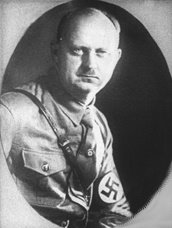Wilhelm Gustloff
 Generally, any talk about maritime disasters almost always revolves around the Titanic, the movie etched in our memory.
Generally, any talk about maritime disasters almost always revolves around the Titanic, the movie etched in our memory.Why?
The Titanic's maiden voyage in 1912, from Southampton to New York, is widely believed to be the greatest maritime disaster of all time. 1523 is not a small number. Ofcourse, no number is small when the number is that of human lives.
This was my belief too, till I happened to read Crabwalk by Günter Grass. Over 10,000 German refugees, wounded soldiers and naval personnel were onboard the Wilhelm Gustloff, when it was hit by three torpedos fired from the Soviet sub S-13, commanded by Alexander Marinesko. Only around 1,200 survived.
Wilhelm Gustloff dwarfs the Titanic. Wilhelm Gustloff was originally to be named after Adolf Hitler but was named after a man who was the leader of Nazi Party in Switzerland. Wilhelm Gustloff (in picture) was assasinated in 1936 in Davos by David Frankfurter, a medical student.
Wilhelm Gustloff was originally to be named after Adolf Hitler but was named after a man who was the leader of Nazi Party in Switzerland. Wilhelm Gustloff (in picture) was assasinated in 1936 in Davos by David Frankfurter, a medical student.
Wilhelm Gustloff was launched in 1937 as the flagship of the Kraft durch Freude or Strength Through Joy Organization (KdF). The KdF is a sub-group of German Labour Front (DAF) and was organized to provide cruises, concerts and cultural activities to the working class. The Führer wanted his labour force to be fresh and in good nerves to grasp his ideas better.
As the Russians closed in on the eastern front, the ship left the port of Gotenhafen, on 30th January 1945, setting course to Kiel, with it's huge human cargo, to a relative safety. The weather was a freezing minus 18° Celsius and there were not enough lifeboats to support the enormous head count on the ship. Two big contributors to the big number.
It is an irony that when only a small fraction of the ships passengers were millitary personnel, this small fraction would make sure that the Gustloff cannot qualify for a civilian vessel and a potential military target. Captain Marinesko would have assumed that the ship carried retreating troops and to be fair to him, there is no way he could have known that the ship carried mostly innocent refugees and wounded soldiers.
 After the torpedos hit, the Wilhelm Gustloff took only around 50 minutes more to go down beneath the icy water of Baltic, off the Stolpe bank.
After the torpedos hit, the Wilhelm Gustloff took only around 50 minutes more to go down beneath the icy water of Baltic, off the Stolpe bank.
Most of the hapless victims froze to death in the icy waters, which may have been a little warmer than the minus 18° Celsius air temperature. The chances of any survivors would have been almost non-existent if not for the heroic work of the other German ships in the area.
It is a shame that a staggering number of those perished were women and children. Most of the survivors were men, all four captains of the ship among them.
The sheer scale of the disaster and the number of lives lost with a single ship, makes the sinking of Wilhelm Gustloff among the wost disasters of all time. For such terrifying loss of life, very little has been written and discussed about it. The reason could be that it was considered a "war loss" and not a civilian disaster. I would assume that very few even know about this disaster.
The wreckage site of Wilhelm Gustloff is now officially a grave site and off-limits to most divers.
Trivia -
It is widely considered by many historians that the sinking of another German ship Goya, by two torpedos of the Soviet sub L-3, on April 16 1945, is the greatest maritime disaster of all time. The numbers vary between 6,000 to 7,000 lives. Considering the unofficial numbers of Wilhelm Gustloff, it is quite possible that the Gustloff disaster could be bigger than the Goya disaster.
The are a few books on the Gustloff disaster. I gather than the book "Der Untergang der Gustloff. Wie es wirklich war." by Guido Knopp, Friederike Dreykluft, Anja Greulich and Mario Sporn, provides an overview of the event. The book "Die Gustloff-Katastrophe" by Heinz Schön is said to be the definitive work on the topic for now. Some reviews for this book can be read here - English/German
The movie "Nacht fiel über Gotenhafen" (1959) or "Darkness Fell Over Gotenhafen" in English, directed by Frank Wisbar is said to provide an accurate account of the disaster.
6 comments:
The fact that little has been written about the "Gustloff" disaster might be due also the fact that Germany ended up on the losing side of the war. The winners get to write the history books, as we have time and again seen.
I definitely feel so. Also, am sure there would have been not much love lost between Adolf Hitler's Germany and the other nations, to have any compassionate thoughts about these people. Infact, Alexander Marinesko was decorated as a war hero in the Soviet but Hitler considered him as his personal enemy.
I've never explored books on wars... your thoughts on what you read makes me feel they can be interesting too.
Let me try some of them.
BTW - plainly put and well written :)
Really interesting stuff. This event was never publicised - reason winners rewrite history.
Thanks for sharing this info. I have always thought that Titanic the biggest disaster in the sea.
Post a Comment